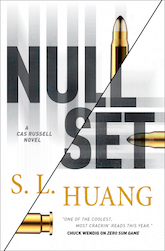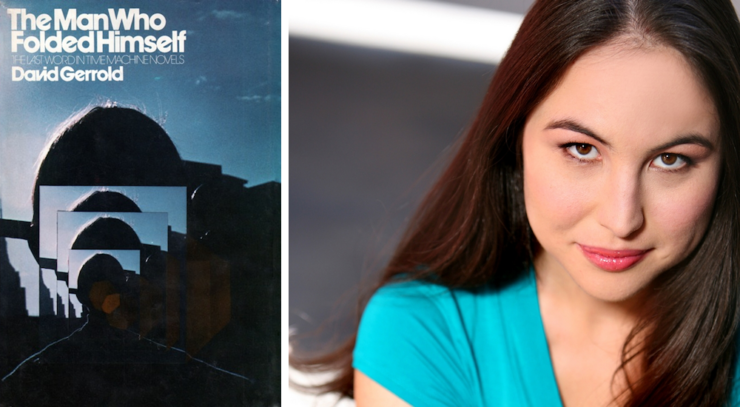Although I read a lot of work by queer authors, very little of it has caused me any sort of revelations with regard to my own sexuality or gender. I’ve certainly read some rollicking good yarns by queer people—recent standouts include Yoon Ha Lee’s Ninefox Gambit, Charlie Jane Anders’ All the Birds in the Sky, and Maddox Hahn’s The Love Song of Numo and Hammerfist—and I love that the world as written by queer people tends to reflect my own multivariegated reality of people. And I’ve also read work by queer people that hit hard emotionally, especially in the short fiction realm—stories like K.M. Szpara’s “Small Changes Over Long Periods of Time”, Merc Rustad’s “How to Become a Robot in Twelve Easy Steps”, or Susan Jane Bigelow’s “Sarah’s Child”—but mostly because they tore back the rawness of a queer experience that is not my own and helped push my empathy and humanity. It’s hard to think of any books or stories that have been intensely affecting to my own sense of queer self.
Part of this is probably timing. When I was a teenager, there was no Twitter, and I had no awareness at all of any authors who were particularly trying to write their queer experiences into books. I might have vaguely been aware of “LGBT fiction”, but only as a category separate from the action-adventure and SFF books I knew I liked, and I’m sure I had a vague impression of the genre as contemporary tales grappling with issues like coming out. And though I’m very happy both then and now that such stories exist in the world for people who want them, they have never fallen into the category of books I felt a particular need for or desire to read. I don’t think it ever even occurred to me to ask the question of how to find my books, with swords and dragons and aliens and spaceships, and also queer people.
But when I stumbled across them, how great it was! Like many queer readers, I fell hard and fast for any character who was a little bit different in sexuality or gender. The Fool in Robin Hobb’s books made an indelible impression on me, for example, and I found myself utterly unable to ever forgive main character Fitz after his scornful, brutal rejection of the Fool’s gender nonconformity. So it wasn’t that I didn’t thirst for these characters, but I didn’t know how to ask for them—and even if I had, I’m not sure it would have been as easy to surround myself with those books a few decades ago as it happily is today.
Which meant I found David Gerrold by literally picking him at random off a library shelf.
When I was in college, I used to browse the MIT Science Fiction Library whenever I had a few minutes, at all hours. The library has ninety percent of all science fiction and fantasy published in English, and is a far different experience than the single tiny section some libraries and bookstores afford to genre fiction! Because it has everything, I never knew what I was picking up. I discovered Diana Wynne Jones and Harry Harrison there without having any idea they were famous. I would also often grab books that were completely unknown, some of varying quality, many enjoyable but forgettable.
I picked up The Man Who Folded Himself off the shelf because it had an interesting title. I had no idea it had been nominated for the Hugo and Nebula (and indeed only had the vaguest idea what those awards were, from stickers on books). I had no idea I’d been watching David Gerrold’s work on TV for years, and that he’d written one of my favorite Star Trek episodes. And I had no idea that David Gerrold was gay.
(Spoilers for The Man Who Folded Himself follow—if you haven’t read it, I highly recommend it.)
The Man Who Folded Himself is in a category of science fiction I love, a category which I will refer to by the ungainly description of, “postulate a piece of science fictional technology, and then take every possible exploration of it to its logical conclusion and SEE WHAT HAPPENS.” Most SF readers will be familiar with the type—it is particularly popular among classic SF authors but still very sellable today, forcing every possible interaction of the technology with the characters and society. It’s the “what if?” premise that then spirals to fantastic heights.
The Man Who Folded Himself does this with time travel. It is a delightfully self-contained book, and could be described as really only having one character in the whole thing, who meets himself over and over in a tremendous number of iterations. And it is wickedly clever. The premise sets up infinite possibilities, and the execution pushes that “explore everything to its logical conclusion” aspect in the best possible way, until the book folds in on itself like a fabulous origami of paradoxes that somehow make sense.
It is one of the best time-travel stories I have ever seen.
It is also very queer. The main character has sex with both male and female versions of himself, and becomes male and female versions of himself, and gives birth to male and female versions of himself/herself—I mentioned there’s really only one character in the whole thing, right?
The upside-down thing about reading it, though, for me—several decades ago, near the turn of the millennium, when I didn’t even know how to ask for queer—was that it didn’t actually read as LGBT fiction to me. Even though it is most certainly classed that way by people today. Maybe because I didn’t know that LGBT fiction could also be SFF fiction, but I think more because… well, the way the book set it up, I read the queer bits as inevitable. Of course the main character would have sex with himself, and would switch genders. Because this is the type of book where we push the SFnal tech to every logical conclusion and explore infinite possibilities, right? That’s the type of book I’m reading! And of course those are some of the possibilities so of course some iterations of the main character would do those things, because it would be a total failure of the subgenre not to!
But.
It stuck with me.
The whole book stuck with me also as a flat-out amazing novel, but the gender and sexuality aspects in particular stuck in my head, even though they’d seemed like such logical and seamless bits of the book at the time. Some itch I couldn’t define. I wasn’t even sure why.
Years, years, years later I found out David Gerrold is gay. And I read some interviews with him where he talked about the apprehension in writing those scenes, and putting in the gay pieces of the story.
And everything clicked for me.
Buy the Book


Null Set
Because many authors, even in a “push every infinite possibility to its logical conclusion” story—they would not have gone there. They would have imposed strange, artificial restrictions on their characters, so that the story was warped out of exploring those possibilities. The book would have ended up the type where, decades later, queer readers would have shaken their heads and said, “It’s a good book, but wow, did the author forget about some of the possibilities here.”
Or, worse, other authors would have shoehorned in queerness as a hat trick, a “clever” science fictional premise winking at the audience about how far it is off the default. I’ll never forget the feeling I got when I read Joe Haldeman’s The Forever War—which was written in almost the same year as The Man Who Folded Himself—and I wanted to stab it through with a very sharp fork. It, too, tries to address queerness in the context of science fiction. But queerness in The Forever War is not treated as a logical, reasonable possibility, but instead as an unnatural, forced state, one where it’s the happy ending for the characters to rid themselves of it. I still remember the disgusted fury I felt reading those words.
But The Man Who Folded Himself blazed straight past the “defaults” other authors confine themselves in. So many science fiction authors, for all they would like to think of themselves as unfettered creators of future imaginings, warp themselves into a starting point where queerness is not even on the table as a normal thing. It’s not somewhere the book is going to go, unless it’s as one of those “clever” SF conceits. Even if it would be the most reasonable thing in the world for the characters, even if the book fails to deliver on some of those infinite possibilities if it doesn’t . . . the book doesn’t go there. Because it’s simply not in the author’s world as an expected potential.
So when I finally learned that David Gerrold was gay, and that’s why he had written the book the way he had—it was in my early years of looking toward publication myself, and I had a revelation. Not as a queer person, but as a writer.
Gerrold had refused to be bound by artificial defaults. He asked the questions and followed where they led, and wrote a book that was fearless in exploring all of those conclusions. That’s why The Man Who Folded Himself, which was written in 1973, still reads amazingly. And that’s the type of fiction I want to make sure I write.
Questioning cishet defaults is more in the social consciousness now for all creators—take a show like Orphan Black, for example, which includes lesbian and trans clones as part of Sarah’s infinite variety. But I’ve held the lesson from The Man Who Folded Himself close in my head as I’ve explored my own science fiction worlds, because there are so many defaults it’s so easy to box ourselves into, if that’s all we’ve known. I don’t want to create gendered magic that erases nonbinary people. I don’t want to build a science fictional society that forgets about the existence of neurodivergent people. I don’t want to “invent” a clever SFF premise that accidentally echoes the cultural mores of a real-life people, and it only seemed alien to me because it wasn’t part of my unquestioned world. My post-apocalypses and my fictional disabilities should not forget about the ways people have learned to live with similar situations on our Earth, just because those aren’t part of my reality.
I want to question all the defaults and go where all the possibilities lead. Because I’m a science fiction writer, dammit.
A year ago I was lucky enough to get to meet David Gerrold and have dinner with him. I told him how much I had loved The Man Who Folded Himself. I didn’t tell him all of the rest of this, because I was trying very hard to wear my professional hat instead of my fangirl one. But I hope he knows just how much he’s affected future generations of queer writers and queer readers.
S.L. Huang has a math degree from MIT and is a weapons expert and professional stuntwoman who has worked in Hollywood on Battlestar Galactica and a number of other productions. Her novels include the Cas Russell series—book two, Null Set, publishes with Tor Books on July 9th. Her short fiction has appeared in Strange Horizons, Nature, Daily Science Fiction, and The Best American Science Fiction & Fantasy 2016.










